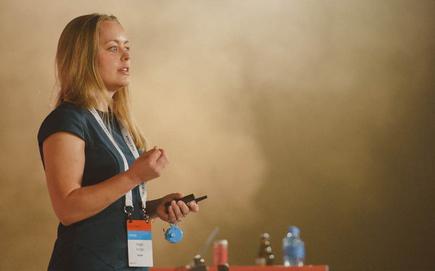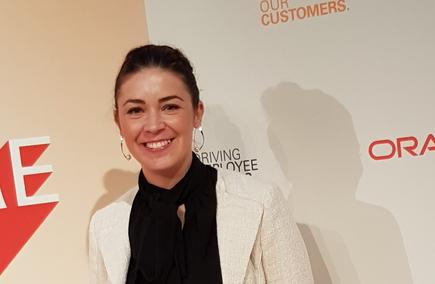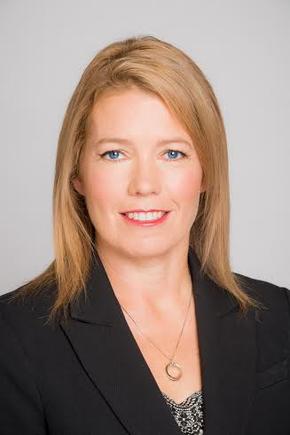Diversifying tech: Change the conversation, challenge the norms, celebrate successes
- 10 October, 2017 06:30
Dexibit CEO Angie Judge believes New Zealand can do a lot more in putting achievements of women in technology in the limelight.
“There are a lot of amazing women entrepreneurs in the technology and science fields. They are beavering away and working really hard, and we don’t give them enough of the spotlight,” says Judge, whose company provides software for museums around the world.
She raises the point this week, when the world celebrates Ada Lovelace Day (held on the second Tuesday of October and named after the pioneer computer programmer).
“We should use Ada Lovelace Day not just to talk about it, but to showcase and celebrate the people who have been successful.
“Because I think the best thing you can do to inspire a young woman is to show her someone who has been there, provide her with a coach. These are the things that get more girls into technology.”

There are a lot of amazing women entrepreneurs in the technology and science fields. They are beavering away and working really hard, and we don’t give them enough of the spotlight
Thus, she invited five such achievers to celebrate in their own way, the achievements of women in science, technology, engineering and maths.
The group met over coffee at the Icehouse office of Dexibit, and was composed of CEOs Alyona Medelyan of Thematic, Amelia Gain of Preno, Miriana Lowrie of 1 Centre and Gemma Hurst of Page Proof, and Dexibit head of product Alex Garkavenko.
They have, in their own way, been trailblazers in the industry, and devote their time as much as they can in helping promote diversity in the sector. First, in their respective organisations and at forums aimed at encouraging more young people to consider a career in information technology.
Miriana Lowrie recently spoke at a local intermediate school girls group about pursuing a technology career, and at a panel discussion where she shared her perspective as a female and Maori technology entrepreneur.
Gemma Hurst talks about having a diverse team at work as a norm. “We have more women than men...it just happened that way, coming from different cultures.”
Amelia Gain studied information technology and pursued a different career path, being owner and director of a hotel. She combines both of these experiences in Preno, which provides an online management system for boutique accommodations.
Alex Garkavenko studied architecture, and did some editorial and curatorial work. “Before my eyes, I could see my career paths narrowing,” she says, following her stints in media and a museum.
“I always had a curiosity in science,” she says, and then pivoted her career towards technology, first working at Dexibit as data architect.
“I have not put myself into a niche. I always keep my mind open, get continuous feedback, while taking my past experiences into a more creative field.”
STEM plus arts
Alyona Medelyan started the organisation STEAM Ahead three years ago, which promotes STEM with arts (the ‘A’ in steam). She says they run events, in conjunction with Futureintech, encouraging mothers and caregivers about technology as a career choice for girls.
Medelyan has a masters degree in linguistics and a doctorate in computer science.While attending an applied mathematics class, the lecturer mentioned there are algorithms that translate text automatically.
“I realised one day, there is not going to be a lot of work for people translating and interpreting languages.

"I can upskill myself a little bit and benefit from both knowing how languages and how computer science and algorithms work, and somehow find a niche. This is how I learned a skill called natural language processing, which is pretty much the intersection of these two very different fields."
Early this year, Medelyan and her husband took part in the Summer 2017 batch at YCombinator, a startup accelerator that produced companies like AirBnB, Dropbox and Stripe. They spent two-and-a-half months in California, taking their children with them.
“You don’t have to be a student in a hoodie from Stanford to start a tech company.”
Uncovering hidden figures
Eva Sherwood, account executive at Oracle New Zealand and a board member at NZTech says Ada Lovelace Day is all about raising the profile of women in STEM.
She is adamant about the need to promote more women leaders in the industry so that younger people will have role models.
“This is a unique time to talk about amazing women,” says Sherwood.
“Just draw attention to the women that you know that are excelling in technology, that’s it!” says Sherwood on how organisations can celebrate Ada Lovelace Day.
“Write a tweet, put something on LinkedIn, promote a friend or someone you admire, put it out in the world.”
Sherwood joined the NZTech board over a year ago, and put her hand up to run the organisation’s women in technology programme.

It does not matter what you are good at or what you are into. There will be a job for you in technology.”
“It was something I felt quite passionate about, I felt quite empowered to take over the role, having been often the only woman at the table or in the room,” at work.
She says a new programme they launched, together with the Ministry of Business, Innovation and Employment, is Return to IT, which focuses on supporting women who are returning to ICT after an extended break.
She says NZTech is also encouraging more women to nominate other women to industry awards.
“This relates back to having role models, unless we get women standing up [for these awards], showing it can be done, then we are not going to break down the poor percentages of women in tech.”
Sherwood says research shows between 23 and 26 per cent of technology roles in the country are filled by women, but this number shrinks as women go into leadership roles.
“The real scary thing for me, working at a corporate like Oracle, is we are always looking for talent. We are always looking for diversity and we are drawing from the same pool of women.
“What we really need to be doing is growing that pool of talent and the way I believe we can do that first is through education.
“NZTech is doing a great job of getting digital into our curriculum, so it becomes more normal.”
Getting that into our education system is important, as well as getting girls through programmes like Shadow Tech to expose them to the variety of roles that exist in technology, she says.
As she sees it, around 20 per cent of roles within the sector are technical, like data science and software engineering. She says the remaining 80 per cent a range of roles.
“The tech industry has variety,” she says. “It does not matter what you are good at or what you are into. There will be a job for you in technology.”
Today is #AdaLovelaceDay... we're celebrating #womenintech #womeninstem with @CIO_NZ https://t.co/3m1S2G6T2N
— Angie Judge (@angie_dexibit) October 9, 2017
Leading the way
Company advisor and board director Candace Kinser says going into science and mathematics is not necessarily an easy path for a lot of people.
“I think the overriding message for getting younger people to be more involved in STEM is that if you are really good in it, absolutely 100 per cent go for it because you definitely are needed in that space,” says Kinser, who is currently director of Livestock Improvement Corporation, ERoad, Talent International and the Well Foundation.
However, if STEM subjects are not really your favourite; “Don't think you can't have a rewarding career in a STEM type role, just because you don't have a degree in one of the subjects,” says Kinser, who won the leadership category in this year’s AUT Business School Excellence in Business Support Awards.

Don’t be afraid to step out of your comfort zone, especially when you're young and early in your career... Embrace the opportunity
Kinser cites her own case, where an undergraduate degree in anthropology and political science, and a masters in business, led to a career in technology.
“It was those sorts of skills I learned in anthropology and political science that taught me to look at situations or people without judgment, and really understanding empathy. ‘Here is a person, this is the way they choose to live their lives’.
“Those two degrees gave me the confidence to go into a career I did not necessarily know what I was doing when I started out,” says Kinser.
“From political science, what is it we can do as governments and politicians to help shape a better future, and a healthy future with educated people?”
She says there are other skill sets that need to be encouraged and taught that will contribute to a successful career.
“For any career, it does not matter what it is and whether it exists today or has yet to be invented, the main thing that we have as humanity that has served as well, is to be curious and to investigate what is possible.
“There are lots of leadership lessons we have to impart on to young people,” she says.
“First of all, don’t be afraid to step out of your comfort zone, especially when you're young and early in your career... Embrace the opportunity.
“That is important to young entrepreneurs and for people getting into technology, as it seems to be a bit of a scary place. But no one was born an expert. You can actually learn the skills to be productive.”
Growing diversity
Jennifer Rutherford, government segments proposition manager at Spark and chair of NZ Hi-Tech Trust, talks about some ways organisations can help change views and practices around diversity.
She cites her experience at the NZ Hi-Tech Trust, which runs the annual Hi-Tech awards. The trust introduced changes to make the awards more open by allowing nominations “as other groups won’t put themselves forward”, she says. The trust also introduced the Maori Innovation Awards, with support from Callaghan Innovation.

This year, the trust is changing the judging criteria to include key questions how the company promotes diversity and inclusion.
“How does your company bring diverse ideas? How do you ensure inclusion no matter [what] your gender, race, or where you come from, what your personality type is, where your thought process comes from?”
“If those programmes are new, tell us what you are doing to make progress," says Rutherford.
“We really are trying to encourage people, no matter where they are at, to do something.”

Send news tips and comments to divina_paredes@idg.co.nz
Sign up for CIO newsletters for regular updates on CIO news, views and events.
Follow Divina Paredes on Twitter: @divinap
Follow CIO New Zealand on Twitter:@cio_nz


